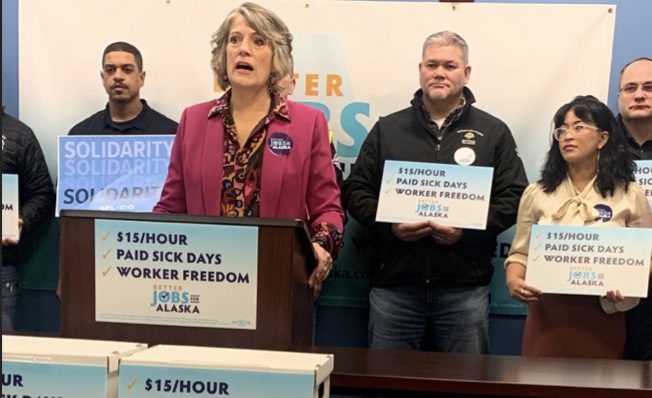
An eclectic group representing a cross-section of Alaska workers delivered petitions to the Division of Elections on Tuesday with more than 41,000 signatures of supporters for a ballot initiative to raise the state’s minimum wage, require paid sick leave and increase worker freedom from employers.
With working families facing real challenges, increasing the minimum wage to $15 an hour and ensuring that hardworking Alaskans can earn paid sick days is the right this to do, said spokespersons for Better Jobs for Alaska, during a news conference preceding the delivery of the petitions to state offices.
No one who works full-time should have to live in poverty, but working families are struggling at today’s minimum wage of roughly $24,000 annually, the group said.
The Alaska Division of Elections now has up to 60 days to count and validate the signatures and announce if the initiative will qualify for the ballot. Better Jobs for Alaska expects the initiative to qualify for the ballot and be considered by voters in the November 2024 General Election.
“As the late Alaska legend and former Commissioner of Labor Tom Cashen once said, ‘Alaska shouldn’t be a chickens–t place to work,’” said Joelle Hall, president of the Alaska AFL-CIO. “And with this important step toward getting this ballot initiative in front of the voters this year, we’re helping to make sure we live up to that.
“While many workers in the Alaska labor movement already make at least $15 an hour and have paid sick days, all Alaska working families deserve the same,” Hall added. “A rising tide lifts all boats and the Alaska AFL-CIO is proud to support this ballot initiative and to continue to fight for all Alaska workers struggling with our rising costs of living. Alaska’s labor movement is ready to mobilize and organize to get this done.”
Alaska has a history of boosting the minimum wage via ballot initiatives.
“Alaskans voted overwhelmingly to increase the state minimum wage in 2014, and from all indications they are ready to do so again in 2024,” said Ed Flanagan, prime sponsor of 23-AMLS, former Alaska Labor Commissioner, and Chair of the 2014 ballot initiative campaign to raise Alaska’s minimum wage. “Other West Coast states have higher minimum wages and require employers to provide paid sick leave. This initiative will enhance recruitment and retention for all Alaskan employers, and lift thousands of our workers out of poverty. A modest increase in the minimum wage does not kill jobs. The minimum wage is supposed to be close to a living wage. It is time we addressed this, hopefully for good.”
“Raising the minimum wage is the common sense and right thing to do when Alaska families are struggling to put food on the table, and I anticipate many other faith leaders and activists across the state will join me in supporting this ballot initiative,” said Rev. Michael Burke, of St. Mary’s Episcopal Church in midtown Anchorage.
Research from the Economic Policy Institute shows that Better Jobs for Alaska will affect Alaskans who most need a raise to be able to make ends meet, the group said. Alaskans who would be directly affected by the minimum wage increase include 55% women, 60% people of color, and 16% parents. Those impacted overall span every demographic and defy stereotypes of who earns minimum wage. Seventy-six percent of those who would be directly affected by the minimum wage increase are adults over the age of 20, and 35% have some college education or even a two- or four-year degree.
“This initiative protects workers who choose to return to their work duties instead of listening to political, religious, or anti-union speech that has nothing to do with their work,” said Gary Dixon, Secretary-treasurer of Teamsters Local 959. “Alaskans have the right to go to work, collect a paycheck and go home without being subjected to their bosses’ opinions, and the Alaska Teamsters are proud to support this initiative.”
“I’m a caregiver, which is essential work taking care of our seniors and people with disabilities in their homes,” said Rebecca Reiss, an in-home caregiver in Wasilla. “Too many caregivers are paid less than $15 an hour, meaning we struggle to keep roofs over our heads or food in our bellies, and it impacts how we can help our clients. And when I recently had to take time off work for a critical surgery, I didn’t have any paid sick days and I lost my apartment. I was lucky enough to have a support system to help me get back on my feet, but not everyone has that.”
The one legislator addressing the news conference was state Rep. Genevieve Mina, D-Anchorage, who said she constantly hears from neighbors who even while working full time are struggling.
“Families can’t afford grocery bills, and rents keep rising. Their wages should rise, too,” she said.














